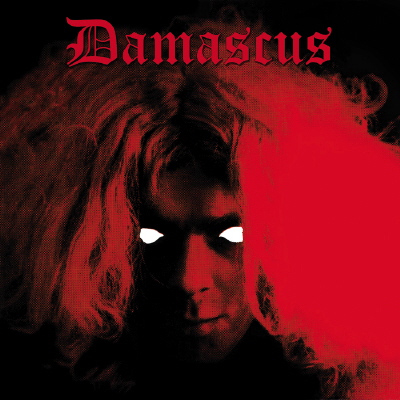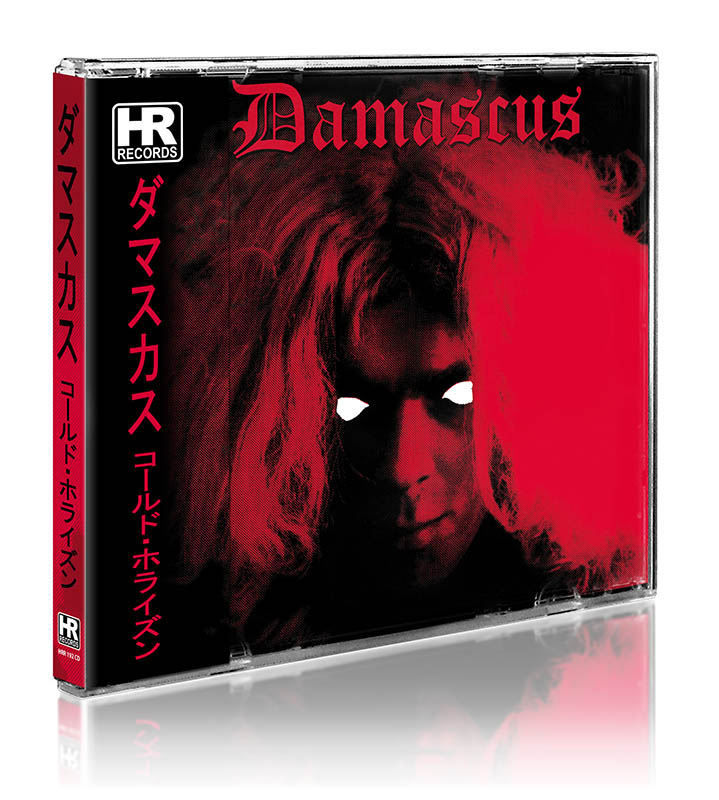 | ||||
| DAMASCUS - Cold Horizon CD RED COVER | |
HRR 192 CD, 24 page booklet, obi | |
| Billy Downs - vocals Dave Bridge - guitars Mike Booth - bass Bill Campion - drums | |
| -Open your Eyes -Looking for Daylight -Another rainy Day -Midnight Train -Dreamer -Goodbye Harry -Something on my Mind -Cold Horizon -Women in Black | |
SOLD OUT! | |
With their one and only, self-published 12" EP from 1984 Damascus carved their name into Heavy Metal history. Whereas in a lot of cases the "importance" of a band gets blown out of all proportion because of the rarity of the vinyl, this is not true regarding N.W.O.B.H.M. legend Damascus. The four songs on their "Open your Eyes" 12" are just so good musically that it is hard to overlook the sheer quality of this rather obscure outfit from the Merseyside area. Speaking strictly in musical terms, "Open your Eyes", "Something on my Mind", "Cold Horizon" and "Midnight Train" are brilliant Heavy Metal songs with a very strong production. For a long time bassist Mike Booth was not aware that Damascus meant a lot to quite a few people: "I have come to realize this in the last few years. It's a great feeling to have produced something that is well thought of. I only heard of the N.W.O.B.H.M. as a movement about ten years ago. When I read that characteristics were rock music with a high level of musicianship and plenty of accented stops like Iron Maiden I saw the connection to us." In addition to those mentioned four songs of the 12" single the "Cold Horizon" album on High Roller will contain five unreleased tracks. Mike explains: "The album features nine tracks that we recorded during two sessions at Amazon Studios in Liverpool. 'Open your Eyes', 'Looking for Daylight', 'Another rainy Day' and 'Midnight Train' were recorded in January 1984. 'Something on my Mind', 'Cold Horizon', 'Goodbye Harry', 'Dreamer' and 'Women in Black' were recorded in June 1984."
Here are some (technical) details of how the band record their material at Amazon Studios: "We used the 16 track (1" tape) studio at Amazon, Liverpool. Dave's guitars were mic'd up from his Peavy Deuce combo amp (solid state pre amp with a valve O/P stage). He used various effects pedals including an Ibanez
Tube Screamer, analog delay and a Morley pro flanger. By the second session
he had added a chorus pedal. Guitars used were mainly a 1970's tobacco Les
Paul and an Ibanez Roadstar II with a whammy bar. My 74 Jazz bass was recorded both as a DI and mic'd up via a HH Bass machine mosfet amp through a Hiwatt cab. On 'Another Rainy Day' I used an Ibanez Artist fretless as well as the Jazz bass. I am using Rotosound RS 66 LB bass strings. Billy was playing a Tama Imperial Star kit with two bass drums. We laid down backing tracks of guitar/bass/drums with a guide vocal and then overdubbed vocals and additional guitar parts and solos. Each session was over two days, recording on day one, then overdubbing and mixing down on day two."
The reason for the band to get their own product out was simple: "We sent demo material to anywhere we thought might get us the chance of a deal but no one was interested to sign the band. The LP became possible on account of Ryker Records agreeing to finance the cutting and pressing of the EP. The guy who was managing us (Howard Croft - who worked at the same place as Billy Downs) organized a deal with a local company called Ryker Records. They would press 1,000 copies at no cost to us, we would get the covers made. If we got signed, Ryker would be involved with the deal. I'd guess we made the money back. The two sessions cost around 500 GBP. We sold the records for 2 GBP. A couple of local record shops sold the EP for us. And we sold a lot of them at gigs. The EP was sold with two different versions of the sleeve. I think there were
1,000 pressed. Originally, when Bill Campion and I were in the band the green
picture was on both sides of the cover. After we left, the EP was sold with a
different back cover which had a picture and names of the new line up." Later on the band recorded a couple of new tracks and sold a 6-track cassette
again listing the new line up. There were three new tracks on the cassette and three tracks which came from the original Amazon sessions.
Damascus was originally formed in 1983: "Dave had left Thin End Of The Wedge (where Bill Campion played the drums) and he got in touch when he was looking for a bass player. I had met him in Curly Music (a guitar shop) when I heard him trying out a guitar around 1978. We had jammed but had not managed to put a band together. Pre-Damascus me, Bill Campion and Dave rehearsed with a different singer and called the band Tarot. We did a couple of gigs then the singer quit. We then went looking for another singer and found Billy Downs. When he joined we all decided a new name was in order. That was Damascus."
As mentioned, guitarist Dave Bridge came from another band loosely affiliated with the N.W.O.B.H.M., namely Thin End Of The Wedge. They released the "Lights are on green" 7" single on Jungle Records in 1981 and went to the finals of the "Battle of the Bands" in 1982. However, Mike does not think there's a big similarity between Damascus and Thin End Of The Wedge: "I'd say the Damascus sound was very much defined by Dave's guitar and Billy Downs strong vocals. I think that Bill Campion with his double bass drums and I also have our own recognizable sound as well."
As mentioned above, Damascus were stemming from the Merseyside region, after London, Sheffield and the North East probably one of the main hotspots of the N.W.O.B.H.M. Mike confirms: "There were lots of bands, but also lots of live venues like the Moonstone (pub) where there was live rock seven days a week. Because we rarely appeared on the same bill with another band the competition was only really down to finding gigs. Howard Croft was good at that. We didn't support any big bands. Mainly we played places where there was just us on the bill, and mainly around an established rock circuit in the North West of England. We did play once in London at Dingwalls." Not many Merseyside Metal bands made it big (maybe apart from Spider who snatched up a couple of prestigious support slots for well-known bands) and this had a reason as well: "I'd say the rock scene was low key in the 1980's. The main Liverpool scene was involved with the post-punk bands like Teardrop Explodes, Echo And The Bunnymen, OMD and loads of others. Bands like Damascus weren't commercial at that time."
Matthias Mader
